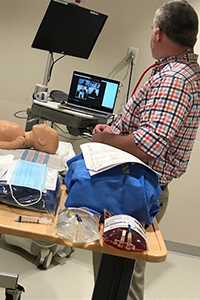Simulation Center plays vital role during COVID crisis and beyond

Simulation Center staff adapted their training programs, offering more virtual sessions and additional in-person sessions with smaller class sizes.
Early in the COVID-19 crisis, Yale New Haven Health’s SYN:APSE Simulation Center was asked to create precise, step-by-step instructions on safely using and reusing personal protective equipment.
Rather than use even a single item of precious PPE, Stephanie Sudikoff, MD, asked Simulation Center staff to create fake PPE, which they used to develop the instructions employees still rely on.
The project was one of a number that demonstrated the Simulation Center’s resourcefulness during a time when out-of-the-box thinking was often required.
“We received so many different requests for assistance,” Dr. Sudikoff said. “It seemed as if people would contact us when they had a problem they didn’t know how to fix.”
 During COVID-19, YNHHS’ SYN:APSE Simulation Center held a virtual “boot camp” for neonatal intensive care physician fellows from throughout the Northeast and mid-Atlantic region. Jacob McPadden, MD, neonatologist, was among the experts who led sessions via Zoom.
During COVID-19, YNHHS’ SYN:APSE Simulation Center held a virtual “boot camp” for neonatal intensive care physician fellows from throughout the Northeast and mid-Atlantic region. Jacob McPadden, MD, neonatologist, was among the experts who led sessions via Zoom.
One major Simulation Center project was developing “just-in-time” training for clinicians who needed to hone their skills to care for the influx of COVID patients on med-surg and intensive care units.
“You might have a dermatologist who needed a refresher on caring for med-surg inpatients, or an experienced nurse who needed ICU training,” Dr. Sudikoff said. “The just-in-time training allowed the health system to redeploy physicians and staff to areas where they were needed most.”
The Center’s subject matter expert in human factors – a field that deals with the relationship between people and the systems with which they interact – helped develop COVID-19 testing operations for YNHHS, the state and area nursing home staff.
“Every testing site was a little different in terms of physical space, staffing and the types of testing offered – asymptomatic, symptomatic or pre-procedure testing,” said Rebecca Berg, a simulation learning consultant specializing in human factors engineering. “Our job has been to ensure the testing process is as safe and efficient as possible.”
In addition to COVID-related projects, the Simulation Center continued offering its regular services – with modifications.
“Our technical team created a virtual platform using Zoom and simulation software to perform simulations while social distancing,” said Antonietta Hallet, simulation development strategy specialist. “Our educators are skilled at adapting existing programs to a virtual environment and coaching instructors to be successful in online content delivery.”
The Center’s modified training model was put to the test in July, when SYN:APSE hosted a two-day, virtual “boot camp” for 90 neonatal intensive care physician fellows from throughout the Northeast and mid-Atlantic region. Center staff set up multiple training stations and “broadcast” to participants.
Other Simulation Center COVID-19 efforts included creating “flash cards” with instructions to change settings on each of the 13 different types of ventilators used across YNHHS. Sim Center staff also assisted with employee wellness efforts, including employee quiet rooms setup and well-being check-ins.
Hallet said that while challenging, the COVID-19 crisis allowed Simulation Center staff to use many of their skills, and apply them in new ways.
“It was wonderful to see how flexible people were in adapting to change,” she said. “So many people from different departments throughout the health system worked together and met some very tight deadlines. It was rewarding to participate in such important work.”


